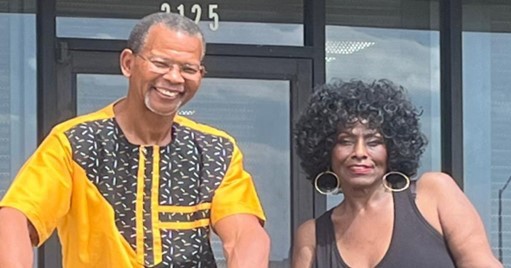DEI Renaissance Black History Month E-Book:
WeDevelopment FCU
[caption id="attachment_23937" align="aligncenter" width="511"]

Ajamu Webster, board chair, and Gail Washington, CEO of WeDevelopment Credit Union pose in front of the credit union's future home at 3125 Prospect, KCMO.[/caption]

Kansas City, Missouri
Newly chartered in 2022
$1.4 million in assets
https://wedevelopmentfcu.com/
While the WeDevelopment Federal Credit Union (WDFCU) charter only became effective in July of 2022, this de novo effort was actually 13 years in the making.
The city of Kansas City, Missouri, was just beginning to make its way out of the subprime mortgage crisis that ravaged communities nationwide from 2007-2010. Because mainstream banks deserted the area, check cashing, title loan, and payday loan companies began filling the void.
Kansas City’s low-income, mostly Black, communities began to find themselves trapped in a cycle of debt as usurious lending practices became ubiquitous.
It was at this time that then Kansas City, Missouri, Mayor Mark Funkhouser made it his mission to improve the economically distressed areas in the community. It was clear that the lack of trustworthy banking options was contributing, in part, to the disproportionately high percentage of African Americans in the city who were unbanked. Therefore, a task force was created to determine the need for an inner-city banking institution.
After the task force completed its work, Ajamu Webster, task force chair, along with a few other members, reported findings that led to a recommendation to open a community development credit union.
A Personalized Approach to Banking
Initially, the group set out to raise $400,000 to fund the credit union, but ended up with $1.5 million in capital funding. To lead the credit union, the board of directors turned to Gwen Washington. Before becoming CEO of WDFCU, Washington was already a 30-year veteran of the banking industry.
When asked what sets this credit union apart from other financial institutions, Washington refers to the personalized experience that members – who are also owners of the credit union – receive when they conduct banking with WDFCU.
“We’re not bank tellers,” she explains. “We’re financial advisors who want to share with you how we can help. We want to communicate the options we have, and how these options help us help you and those who walk through the doors behind you.”
Washington says that the credit union’s central focus is their members’ interests and helping them receive loans at affordable rates, free checking, and higher savings rates.
Webster, who is now chair of the board of WDFCU, explains, “That’s where credit unions excel. Credit unions are the place you go to rebuild your credit.”
Enhancing Financial Wellness, Creating Financial Partners
In addition to fighting back against predatory lending and expanding financial services to the un- and under-banked folks of Kansas City, Missouri, WDFCU has another mission: Financial wellness.
Getting their members to a place of financial wellness requires the ability to make sound financial decisions. Washington understands that the lack of financial literacy in the Kansas City community, which has a poverty rate of 30%, is a generational problem.
“Sometimes people don’t understand how money works,” Washington explains.
She says that’s why the credit union has wealth coaches, who meet with members to address their needs, look at their debts, and help plan a budget. They then pair this financial education with products and other services that can help members finally start to save.
The ultimate goal, according to Washington, is to educate members and cultivate them into “wealth partners.”
“I say that because we need their dollars to spur economic development and promote financial dreams and opportunities,” she explains. “We look forward to becoming financial partners. We call this Social Banking™.”
 Ajamu Webster, board chair, and Gail Washington, CEO of WeDevelopment Credit Union pose in front of the credit union's future home at 3125 Prospect, KCMO.[/caption]
Ajamu Webster, board chair, and Gail Washington, CEO of WeDevelopment Credit Union pose in front of the credit union's future home at 3125 Prospect, KCMO.[/caption]
